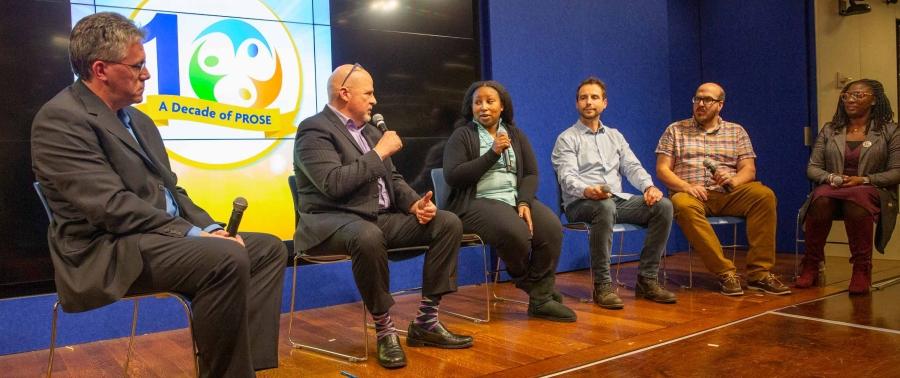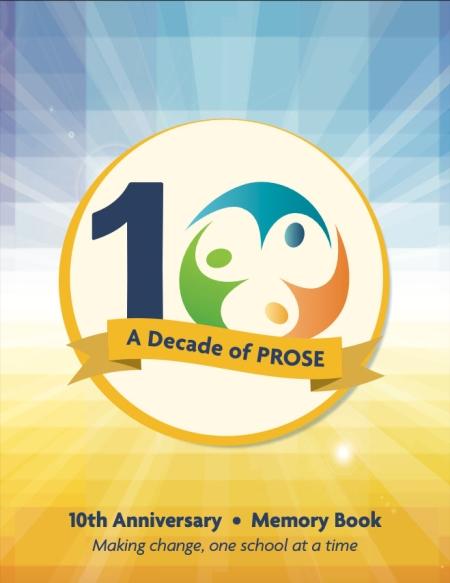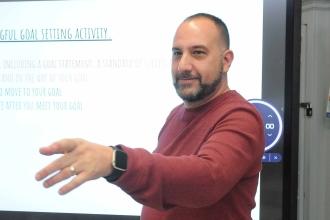
Sally-Ann Famularo, the director of the PROSE program, welcomes everyone to the event.

Elizabeth Flanagan (left) of PS 125 in Manhattan explains her school’s STEAM Projects program to teachers (from second left) Iris Nunez, Hasna Akif-Rajai, Nicole Naraine and Franshesca Chaterpaul of Brighter Choice Community School in Brooklyn.
The Progressive Redesign Opportunity Schools for Excellence (PROSE) program, which affords schools the freedom to experiment and innovate, is marking its 10th anniversary this school year. Nearly 300 teachers, chapter leaders and principals from the now 217 PROSE schools citywide gathered at union headquarters on Dec. 12 to celebrate.
PROSE was established as part of the 2014 DOE-UFT contract to give schools with a proven record of collaboration between administration and faculty additional flexibility with DOE and state regulations and contractual provisions. They use this latitude to rethink tradition and redesign aspects of their schools to meet their school community’s specific needs.
The proposed changes are teacher-driven. “We’re giving control to the people who are actually doing the work,” said UFT President Michael Mulgrew, who moderated a panel discussion of chapter leaders and principals from PROSE schools.
After a school develops its PROSE plan in conjunction with its school community and school leadership team, the plan is submitted for approval to a PROSE panel composed of representatives from the UFT, the principals’ union and the DOE. The plan then has to be approved by at least 65% of UFT members at the school who vote on the proposal.
Sally-Ann Famularo, the director of the PROSE program, said some skeptics in 2014 questioned “whether public schools could be innovative.” The answer, 10 years later, she said, is a resounding yes.
Teachers in PROSE schools presented their students’ work at the anniversary event in Shanker Hall. They spoke enthusiastically about how the program allowed them to reimagine old practices, create new programs and pursue deeper, more engaging units of study.
PROSE schools can adjust their weekly and yearly schedules, which permits more in-depth, project-based units of study for students and more intensive professional development for teachers.
PS 125 in Manhattan, for example, has adapted its schedule to allow for more project-based learning and six half-day PDs per year. This fall, Chapter Leader Elizabeth Flanagan and her 3rd-grade teaching colleagues used the scheduling flexibilities to set aside a long block of time each week for a unit on Peruvian culture for Hispanic Heritage Month.
Emolior Academy, a middle school in the Bronx, has created a half-day for clubs, extracurricular activities, tutoring and test prep, which has boosted attendance and helped struggling kids get targeted help.
PROSE schools also experimented with virtual classes and parent-teacher conferences long before the pandemic hit. Long before the virtual learning initiative now being implemented in some high schools as part of the 2023 contract, the Michael J. Petrides School on Staten Island used PROSE to establish an initiative where students can earn additional credit by taking virtual classes.
Frustrated by how quickly his class textbooks become out of date, Sean Jacobsen, who teaches an AP class on comparative government, started inviting professors from elite universities — experts in the countries the students study — to deliver evening Zoom lectures during the pandemic as a way for students to keep abreast of current international events. Now about 100 students from high schools across the country log on each week to hear the lectures that Jacobsen organizes.
Other schools have used PROSE to change teacher evaluation, student report cards, parent-teacher conferences, student recruitment and more.
The PROSE chapter leaders and principals who spoke at the event all emphasized the importance of collaboration. By creating an environment of trust and mutual support, said Carlos Rodriguez, the former chapter leader at Petrides, “PROSE schools can do things other schools can’t do. With PROSE, teachers start to think differently.”
The PROSE program isn’t for every school. “Not everyone gets in, and not everyone maintains the level of collaboration they need to stay in,” said Famularo.
But for teachers in successful PROSE schools, having a say in the direction of their school and how students learn has been a game-changer.
“PROSE,” said Flanagan, “gives teachers the freedom to actually teach.”
Time for projects
Central Park East II, which has participated in PROSE for all 10 years of its existence, has used the freedom that the program affords to embrace project-based learning, change its teacher evaluation system and more.
‘A game-changer’
Thanks to the PROSE program, Concord HS, a transfer high school for students ages 16 to 21 on Staten Island, has been able to revamp its school hours to meet the needs of its unique student population, who have not thrived in a traditional high school. That flexible schedule means that students don’t have to choose between school and shifts at Amazon or other work.



